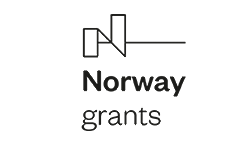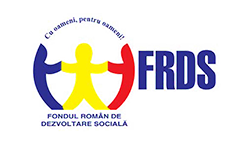Inclusive Education and Skills for a Democratic Culture, Wergeland Center – Oslo
At the end of March (March 24-27, 2022), school teacher Adriana Mititelu (Tulcea county) was selected to attend a training session in Norway, provided by the European Wergeland Center in Oslo. On this occasion, she sent us some information about the activities she was involved in:
As a participant in the project Children and youth integrated for a better world , I learned with great interest about the opportunity to participate in training session in Norway on a topic of real interest and of great relevance Inclusive education and skills for a democratic culture. With some reluctance I filled out the registration form and here I was selected among the 24 participating teachers.
In the first day, I participated to the course held by Elizabeth Kasa, trainer from of the Council of Europe, namely Inclusion and the reference framework of competences for democratic citizenship. Emphasis was placed on: clarifying the terms exclusion-segregation, integration-inclusion; the role of the EU in the inclusive education approach and the Salamanca Declaration (1994). The Declaration promotes the principles of integration and the recognition of the need to act for the creation of “schools for all”, institutions that include all children, with respect for differences between them, support students in the learning activity and respond to individual requirements. It was insisted on the idea that an inclusive school must include in the education process all children, regardless of physical, intellectual, social, emotional, linguistic or other conditions.
There were discussions related to the difficulties faced by teachers in Romania/Norway and the conclusion was that Inclusion does not take place until the school culture changes (in terms of values, behaviors and approach).The program of the second day was related to the Whole school approach, trainer: Valentina Papeikine, Wergeland Centre. WSA involves the involvement of ALL members: school administration, teachers, students, parents, local community members.
- at the level of teachers: curriculum, methodology, extracurricular activities, the inclusion of activities that involve the development of democratic skills in the act of teaching, interdisciplinary activities
- at the administrative level: student involvement in school decisions
- at the community level – involvement of parents in the decision-making process, interschool partnerships, partnerships with local institutions.
- examples of good practice/Norwegian experiences
- a major goal for Norwegian education throughout the 13 years of schooling is language confidence and belief in one’s own culture as a basis for identity development, respect for other cultures, active social participation and lifelong learning
- The role of teachers is essential to an effective education system (they have the power to bring about change – to make students and parents feel heard and valued)
Also then, we participated in a role-playing game, in which we were divided into groups of trainees, organized as teachers, parents, principals, students. Each group had to establish three fundamental needs for the school, and at the end a priority need was negotiated between the groups. Given that a former graduate of the school wanted to grant a sponsorship of 25,000 euros, a dialogue took place with the sponsor, each trying to convince him of the need considered the most important.
The third day was dedicated to the education of Roma children and their integration into the collective – trainer: Ramiza Sakip, from Council of Europe. The discussion looked at the UNICEF and UNESCO framework regarding the integration of Roma children and recommendations regarding the approach of meetings with parents and the integration of Roma students into the collective.
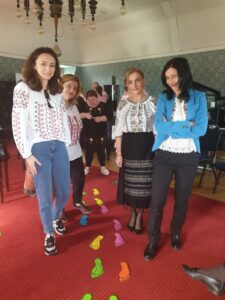
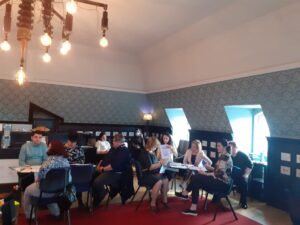
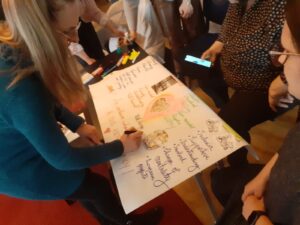
- A positive atmosphere, encouraging cooperation and a sense of belonging to a group. The feeling of belonging to a group helps to increase self-confidence and reduce the fear of failure in completing tasks. Ways to promote group cohesion: interactive group activities, games or sports activities.
- Let’s make sure that all children feel special and valued by formulating positive assessments at all times, without making comparisons between children, without creating hierarchies in the group. You can design activities that make each child feel special.
- Stimulating children to develop independent thinking, make decisions and find solutions to problems. If a task is perceived as too difficult or if problems arise within the group, instead of rushing to give solutions or decide what you think is appropriate, it is preferable to ask questions and offer alternatives.
- Avoiding negative judgments and evaluations of their performance and choosing positive wording. If a task is not successfully completed, instead of saying “try harder next time,” you can choose to conclude “we’ll have to find a better way to learn how to do this”.
- Providing opportunities for mutual aid. By creating situations where children have the opportunity to help a classmate and be helped, you boost self-esteem and encourage pro-social behavior.
- Connecting educational activities with cultural elements with which children are familiar. In particular, the inclusion of links with Roma culture will have a positive effect on the self-esteem of Roma children, but it will also facilitate the learning process (it is easier to learn starting from something familiar) and develop positive attitudes in other children.
- Children will be encouraged to relate to positive role models. It is useful to involve Roma adults who can represent successful role models that Roma children can identify with, for example, with young Roma who recognize their Roma ethnicity and who can also speak Romani.
Prof. înv. primar
Adriana Mititelu

